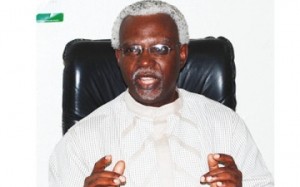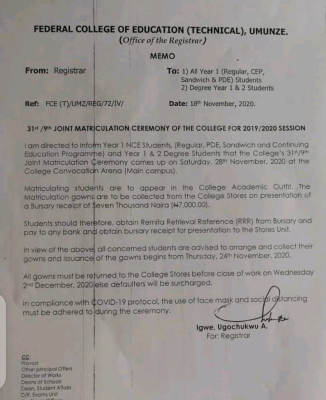
The Chairman, Independent Corrupt Practices and Other Offences Commission, Mr. Ekpo Nta, in this interview with some journalists, explains the thrust of the commission’s anti-corruption campaign in tertiary institutions, JOHN ALECHENU was there
The ICPC has joined the National Universities Commission in checking the operations of fake universities. What was your last experience like?
Some of these illegal degree-awarding institutions claimed to be representing institutions abroad. To tell you the thoroughness of what we had to do, we made contacts with the ambassadors of such countries, apart from going to Google, which would give us an immediate response. We are also building bilateral relationships with other countries to help wipe out the fake institutions.
We need to re-orientate parents and that’s why we normally hold town hall meetings. The desperation of some parents is contributing to pushing children into wrong places. When you begin to send 15 or 16- year-old children to Ukraine to go and learn a new language before he or she could start the real higher education programme, you are creating a problem already. If it’s a boy, you could say, ‘He would be able to find his level.’ But imagine your 16-year-old daughter going to Ukraine because you want her to go and read medicine in a society that is overtly racist.
When jobs are not available for their people, the foreign hosts begin to look at aliens and target them for racist attacks. You may be in government now or doing one thriving business, what happens to your child if the business ends suddenly or you are thrown out of government? What happens to your 16-year-old daughter who will not be getting money again for sustenance? What is the only option left for her? Prostitution or illegal ventures that would further damage the country’s image and her future. Parents should seek information and they should look at their income before they send their children to any institution abroad. And it is even not all universities abroad that are credible or even known to the Nigerian government.
What was the scenario like when you last raided one of such degree mills?
First, the raid was unexpected. We did not tell the authorities that we were coming. We took quite a number of these institutions and mills unawares. Some would tell us they are not degree-awarding institutions. Meanwhile, we would have collected, as evidence, flyers stating that they award degrees. We would have found academic gowns, research reports and term papers. We also found signed certificates. But we are not just stopping at seizing those materials and freezing their accounts. We also seal up the properties involved. It is the court that is permitted to decide whether they are guilty or not when we produce our evidence.
In one particular instance, a man said the constitution says any one can engage in business in Nigeria and education is business and that he has no business with the NUC. That’s why I say the brazenness with which some Nigerians are looking for money is legendary.
What is the scope of investigation the commission is carrying out within the university system?
I can tell you that some students, particularly females who have gone through the university, know the pressure they went through, because I also have daughters who went through the system. At the end of this exercise, we want to see a situation whereby saying as adults and consenting adults you are in love with your lecturer will no longer be acceptable. You will hold that love until you graduate because you are in a master/servant relationship and there is no way such a relationship will not affect the grading of your papers. We must stop this practice. Though we know that some good girls will be pressurized by peer influence to do what they should not do, if such pressure continues, they should know where to report to.
I am very happy that what we started is beginning to take root in the university system. We know some universities that have already started sacking lecturers and professors for sexual harassment. That is what we want to see self cleansing, like the judiciary is doing. Let different bodies begin to cleanse their systems.
Must you receive petitions before you investigate corrupt practices in varsities?
Let me put it clearly that the television sets you see in ICPC are actually avenues for our job too. When we are watching some programmes on air, we consider aspects that interest us and we note them down. There was an aspect that interested me a few months ago and before the programme ended, our detectives were already at the venue to interview the persons (involved) in order to get more facts. We don’t joke with newspapers. I get newspaper cuttings highlighting areas that we can act immediately in terms of investigation. I just want you to note that what you (journalists) write are not in vain.
You have situations where students who graduate since 2003 are unable to get their transcripts in 2010. Some blame this on corruption within the system. How can ICPC assist in checking this menace?
I can speak authoritatively on the issue of transcripts because I was a records officer of a university as the senior assistant registrar. The job is tasking and does not give you opportunities to travel. You can be there for 15 years, and you won’t travel out of your office because that is the way the university system has designed it and it requires a lot of intellect for you to have proper records. However, universities exist on the basis of records and so we must begin to pay attention to the training of records officers to move what we have now to the electronic version. But we are going to help the universities to come to agreement on a timeline in which a transcript must be produced after an application and not at the discretion of an individual.
How were you “received” by the universities you visited?
Some of the universities complained bitterly about visitation panels, not from the NUC but from different bodies. When the panels come, they expect the varsity authorities to give accommodation, provide transport and all kinds of things. We have put that in our report and it will be unfortunate for any public officer who goes to request for such things in future, because we are going to make it public.
Why is the ICPC interested in tertiary education?
The main reason is quick gains. If I am doing something, I want an immediate gain and the quickest gain is at the tertiary level because these are the persons who are coming into positions of authority. They are the people who will be taking over from us and they are the ones graduating. If ICPC is doing what we are doing now at the primary school level, it will take another 20 years for us to see the effect, but at the university level, by next year, I can see the effects.
But why is the ICPC just coming in now to fight corruption in varsities?
No, we are not just coming into the university system. We fight corruption in all the sectors of the economy. However, we believe that since those in the university are the ones preparing new graduates that will take over from us, as I said earlier, the culture of impunity and corruption should be stopped there. For instance, you mentioned the issue of transcripts; when a student knows that he will not get his transcript without bribing a member of staff, he goes into the society with that mindset and this is not good for the nation. So, for now, what we are doing in the university is to fight corruption in the system.
In the next four, five years, the emphasis will be on something totally different from what we are doing today. We are emphasising more on prevention of corrupt practices now.
Initially, ICPC concentrated more on investigation and prosecution to make a mark, grab high-profile people, take them to court and get conviction. But you cannot continue to do that on a continuous basis because, as we know, Nigeria is a very religious society. The moment you arrest the head of an organization, his deputy will step in and the pastor or the imam will tell him, ‘It’s not your portion to be caught!’ And he will go ahead to repeat the same mistakes made by his predecessor.
So, we believe that with the reform we are embarking upon in the universities, corruption will be prevented, as the culture of integrity would have been imbibed by all.




